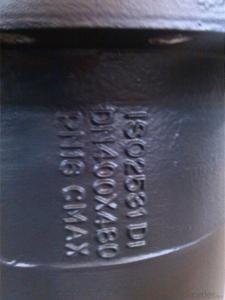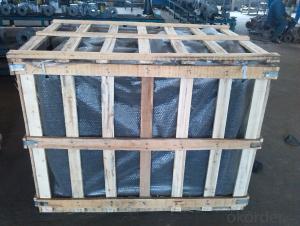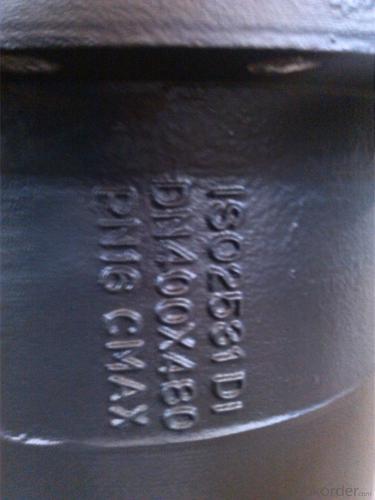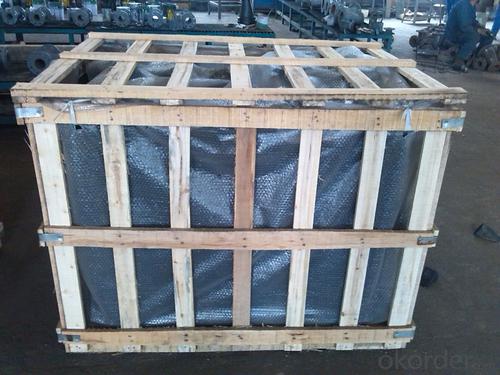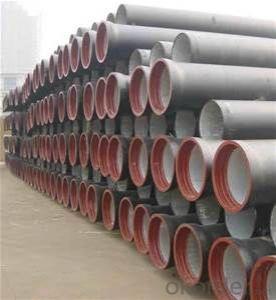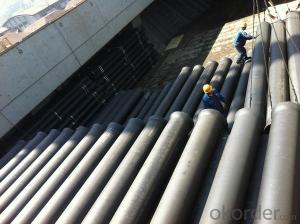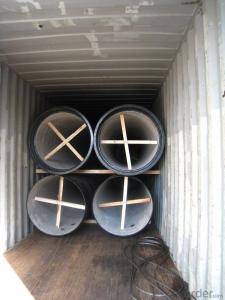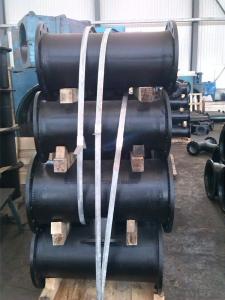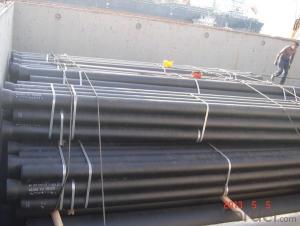DUCTILE IRON PIPE C
- Loading Port:
- Tianjin
- Payment Terms:
- TT OR LC
- Min Order Qty:
- -
- Supply Capability:
- 30000Tons m/month
OKorder Service Pledge
Quality Product, Order Online Tracking, Timely Delivery
OKorder Financial Service
Credit Rating, Credit Services, Credit Purchasing
You Might Also Like
•CNBM ductile iron pioes
•CNBM valves
•CNBM hydrants
•CNBM pumps
•CNBM manhole covers
•All kinds of relative accessories.
- Q: Can ductile iron pipes be used for underground fuel storage systems?
- Underground fuel storage systems can utilize ductile iron pipes, which offer superior strength, durability, and flexibility compared to traditional cast iron pipes. These properties render ductile iron pipes suitable for a range of applications, including underground fuel storage. An important advantage of ductile iron pipes is their resistance to corrosion, a crucial factor for underground storage systems that may encounter various fuels and chemicals. Furthermore, their high tensile strength and resilience enable them to withstand external pressure and loading, ensuring the integrity and safety of the underground storage system. Additionally, ductile iron pipes boast a long lifespan, typically lasting for several decades. This longevity makes them a cost-effective option for underground fuel storage systems, as they can bear the weight of stored fuel and potential ground movements while maintaining the structural integrity of the system over time. Nevertheless, it is worth noting that the appropriateness of ductile iron pipes for underground fuel storage systems may depend on other factors, such as local regulations, soil conditions, and the specific fuel being stored. To ensure compliance and safety, it is always advisable to seek guidance from professionals and adhere to relevant guidelines when designing and installing such systems.
- Q: Are ductile iron pipes resistant to soil movement?
- Indeed, soil movement poses no threat to ductile iron pipes. These pipes boast an impressive tensile strength, enabling them to withstand external forces like soil movement. Specifically engineered for flexibility, they possess the ability to absorb and distribute stresses stemming from ground settlement or other soil movements. Moreover, their robust construction allows them to resist the compressive forces exerted by the surrounding soil. Consequently, ductile iron pipes represent a dependable and enduring option for underground pipelines, ensuring long-term stability and safeguarding against soil movement.
- Q: Fire water supply network adopts ductile iron pipe, the test pressure should be no more than MPa
- Strictly speaking: the outer pipe network and the internal pipe network are the same. Minimum fire 1.0MPa, minimum sprinkler 1.4MPa. Because not only in accordance with the water pump, but also take into account the pressure on the fire engine.
- Q: What are the typical pressure surge protection measures for ductile iron pipe?
- There are several typical pressure surge protection measures for ductile iron pipe that help ensure its integrity and longevity. These measures include: 1. Surge tanks: Surge tanks are commonly used to absorb pressure surges and minimize their impact on the ductile iron pipe. These tanks are typically installed at critical points in the pipeline system, such as at pump stations or near valves, to provide a reservoir for excess pressure. 2. Air release valves: Air release valves are essential components in ductile iron pipe systems that help release trapped air and prevent the formation of air pockets. These valves help maintain a stable pressure within the pipe and reduce the risk of pressure surges during operation or sudden changes in flow. 3. Pressure relief valves: Pressure relief valves are designed to protect ductile iron pipes by releasing excess pressure when it exceeds a predetermined threshold. These valves are typically installed at strategic locations in the pipeline system and are set to open when the pressure exceeds a safe limit, diverting the excess pressure to prevent damage to the pipe. 4. Surge suppressors: Surge suppressors are devices that are installed in ductile iron pipe systems to absorb and dissipate pressure surges. These devices act as shock absorbers, reducing the impact of pressure fluctuations and preventing damage to the pipe. Surge suppressors are particularly effective in situations where pressure surges are frequent or severe. 5. Pipe wall thickness: Another crucial measure for pressure surge protection in ductile iron pipe is ensuring an appropriate pipe wall thickness. By selecting a pipe with the correct wall thickness, engineers can ensure that the pipe can withstand the pressure surges it may encounter during operation. This helps prevent pipe failure or rupture due to excessive pressure. It is important to note that the specific pressure surge protection measures implemented for ductile iron pipe may vary depending on the specific application, pipe size, operating conditions, and regulatory requirements. Consulting with experts in pipeline engineering and design is crucial to determine the most suitable pressure surge protection measures for a particular ductile iron pipe system.
- Q: How are ductile iron pipes protected against internal corrosion caused by chemicals?
- Ductile iron pipes are protected against internal corrosion caused by chemicals through a combination of several protective measures. Firstly, these pipes are usually lined with a cement mortar lining or an epoxy coating. This lining acts as a barrier between the chemical substances in the water or sewage and the iron material of the pipe, preventing direct contact and corrosion. In addition to the lining, a corrosion-resistant polymer or bituminous coating is often applied to the exterior of the ductile iron pipes. This coating serves as an extra layer of protection, safeguarding the pipe against any external chemical exposure that may occur. Furthermore, cathodic protection is commonly employed to prevent internal corrosion. This technique involves the use of sacrificial anodes, typically made of zinc or magnesium, which are attached to the pipe. The anodes corrode over time instead of the iron, effectively sacrificing themselves to protect the pipe from corrosion caused by chemicals. Regular maintenance and monitoring of the ductile iron pipes are also crucial in preventing and addressing any potential corrosion issues. This includes routine inspections, cleaning, and repairing any damaged or corroded areas promptly. Overall, the combination of lining, external coating, cathodic protection, and maintenance practices ensures that ductile iron pipes are well-protected against internal corrosion caused by chemicals, prolonging their lifespan and ensuring the integrity of the pipeline system.
- Q: Can ductile iron pipes be used in contaminated groundwater systems?
- Yes, ductile iron pipes can be used in contaminated groundwater systems. Ductile iron pipes are known for their high strength and durability, making them suitable for various applications including water and wastewater systems. They have corrosion resistance properties that protect against internal and external corrosion, making them a reliable choice for transporting water, even in contaminated groundwater systems. When dealing with contaminated groundwater, it is essential to consider the level and type of contamination present. Ductile iron pipes are resistant to many common chemicals found in groundwater, such as certain acids and alkalis. However, in cases of severe or specific chemical contamination, it may be necessary to consider alternative pipe materials that offer better resistance to those specific substances. Furthermore, proper installation and maintenance practices are crucial to ensure the long-term performance of ductile iron pipes in contaminated groundwater systems. Regular inspections, cleaning, and the use of appropriate protective coatings can help mitigate any potential risks associated with contamination. Overall, ductile iron pipes can be effectively used in contaminated groundwater systems, provided the level and type of contamination are within acceptable limits and proper installation and maintenance practices are followed. It is always recommended to consult with experts and consider local regulations and guidelines when making decisions regarding the suitability of pipe materials in specific groundwater systems.
- Q: What is the manufacturing process of ductile iron pipes? Thank you
- Made of nodular cast iron: a strict chemical composition, the content of silicon in molten iron requirements than the original carbon gray cast iron, nodular cast iron in reduced manganese, phosphorus, sulfur content of two liquid iron tapping temperature cast iron is higher than the ash, than the compensation sphere, conceived at the disposal of liquid iron temperature. Off line ball three disposal, that is to add a liquid iron ball agent four inoculation disposal of five nodular cast iron activity is poor, thus shorten the larger, higher demand for pouring temperature and pouring system larger size, more use of the riser cold iron by one condensation heat treatment criterion six iron is iron carbon alloy carbon content greater than 2%, the carbon content in ordinary industrial pig iron containing C, SI and 2.5%--4%, and Mn, S, P and other elements, is a product of iron ores in blast furnace. According to the difference in the shape of the carbon in the pig iron, it can be divided into several kinds, such as steelmaking pig iron, forging pig iron and nodular cast iron.
- Q: How do ductile iron pipes handle cyclic loading in offshore applications?
- Ductile iron pipes possess remarkable strength and durability, rendering them suitable for a wide range of applications, including offshore usage. When it comes to dealing with cyclic loading in offshore settings, ductile iron pipes boast various characteristics that contribute to their exceptional performance. To begin with, ductile iron pipes demonstrate a high resistance to fatigue failure. Fatigue failure occurs when a material undergoes repeated stress cycles, leading to the initiation and propagation of cracks over time. Ductile iron pipes are specifically designed to endure cyclic loading without compromising their structural integrity. This is made possible by their inherent ductility and ability to effectively absorb and distribute stress. Furthermore, ductile iron pipes exhibit outstanding impact resistance. Offshore environments are prone to dynamic and unpredictable forces, such as waves and currents, which can exert sudden and intense loads on the pipes. The superior impact resistance of ductile iron allows it to withstand these forces without experiencing deformation or fractures, ensuring that the pipes remain intact and fully functional. Moreover, ductile iron pipes possess a unique microstructure that enables them to resist corrosion. Offshore applications expose pipes to harsh environmental conditions, including saltwater, which can accelerate the corrosion process. However, the protective graphite matrix present in ductile iron pipes acts as a barrier, preventing corrosive agents from reaching the underlying metal. As a result, the service life of the pipes is significantly prolonged. Additionally, ductile iron pipes have a high load-carrying capacity. In offshore applications, pipes often need to support heavy loads, such as those exerted by equipment, structures, or seabed settlements. The exceptional strength of ductile iron enables it to effectively bear these loads, ensuring the structural integrity and stability of the entire system. Lastly, ductile iron pipes offer ease of installation and maintenance. Their lightweight nature makes them easier to handle and transport during offshore operations. Furthermore, their corrosion resistance reduces the need for frequent maintenance, minimizing downtime and reducing the costs associated with repairs and replacements. In conclusion, ductile iron pipes exhibit excellent performance when it comes to handling cyclic loading in offshore applications. Their resistance to fatigue failure, impact resistance, corrosion resistance, high load-carrying capacity, and ease of installation and maintenance make them a dependable and efficient choice for offshore environments.
- Q: Ductile iron pipe is flexible pipe or rigid pipe
- The flexible tube and you say should refer to the common steel pipe and seamless steel pipe, because the two are by the simple method according to the needs and the deformation, in other words, ductile iron is cast out without deformation.
- Q: Are ductile iron pipes suitable for horizontal directional drilling?
- Yes, ductile iron pipes are suitable for horizontal directional drilling due to their high strength and flexibility, which allows them to withstand the stress and bending forces during the drilling process.
Send your message to us
DUCTILE IRON PIPE C
- Loading Port:
- Tianjin
- Payment Terms:
- TT OR LC
- Min Order Qty:
- -
- Supply Capability:
- 30000Tons m/month
OKorder Service Pledge
Quality Product, Order Online Tracking, Timely Delivery
OKorder Financial Service
Credit Rating, Credit Services, Credit Purchasing
Similar products
Hot products
Hot Searches
Related keywords
